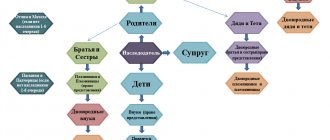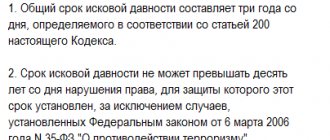Why was an inheritance agreement invented and how does it differ from a will?
It is no secret that after the opening of an inheritance, conflicts often occur in families. For example, the owner bequeathed an apartment to one son, and a car to another. At the same time, he also wanted his son to live in the apartment with his mother, and at the first request, the car would be given free of charge for transportation to his beloved nephew and his family, i.e. everything remained “as usual.”
The heirs may not have known about such conditions, or they knew, but did not want to fulfill them, since the requests were not recorded and this cannot be done in wills. In order for the will of the testator to be carried out, inheritance agreements were created.
An important difference between an inheritance agreement and a will is that the latter is a unilateral act. Unlike a will, an inheritance agreement is concluded by the testator and the heir. This allows the rights and obligations of the parties to be agreed upon in advance.
Notarized will
The procedure for signing this type of will for real estate is established by Article 1125 of the Civil Code of the Russian Federation . The registration process is carried out as follows:
- The text of the document is written by the testator himself: either by hand or on a technical device (computer, typewriter) from his words.
- The contents of the will are read out by a notary.
- The originator signs the document.
- The testator's signature is certified by a notary.
If, due to health problems, the testator is not able to independently sign the document or familiarize himself with its contents, then the text is read out by an employee of the notary’s office - this fact must be indicated in the expression of will. The signature in this case can be affixed by a signatory , who must be chosen by the testator. Information about it should also be reflected in the text.
Attention! When preparing a document, it is allowed to use equipment for recording audio or video. You can also involve witnesses or a translator - in such a situation, their signature must be reflected in the document. The notary can be replaced by an employee of a foreign consulate or another person with such authority.
Who can be the heir under the contract?
Any person who may be called upon to inherit may be designated as an heir under the contract. The list of persons is specified in Article 1116 of the Civil Code.
Citizens who are alive at the time of opening of the inheritance, as well as those conceived during the life of the testator and born alive after the opening of the inheritance, as well as legal entities, the Russian Federation, constituent entities of the Russian Federation, municipalities, foreign states and international organizations can be called upon to inherit.
Those. under such an agreement, the inheritance under a condition can be transferred not only to citizens, but also to legal entities. For example, bequeath a collection of samovars to a museum, but only on the condition that they will be exhibited and not gather dust in storage rooms.
Will in emergency circumstances
Civil legislation does not provide language defining the concept of “extraordinary circumstances”. If we take the general meaning, these are circumstances whose action poses an immediate threat to human life. Drawing up a will in this case additionally implies the inability to contact a notary to certify the document.
In such a situation, the citizen’s will is legal if the text was signed by the testator in the presence of two witnesses .
Attention! If the testator remains alive after a month from the date of signing the document under extraordinary circumstances, the will is declared invalid until the notarization procedure is carried out.
What should you pay attention to when drawing up an inheritance agreement?
1) If a will can be drawn up in the last minutes of life and certified by the signature of the head physician of the hospital, this is not possible with an inheritance agreement. It must be certified by a notary, otherwise it will not be valid. Moreover, when certifying an inheritance agreement, a notary is obliged to video record the procedure for concluding an inheritance agreement, unless the parties to the inheritance agreement object to this.
2) An inheritance agreement, unlike a will, cannot be closed: both the testator and the heir must know about the contents of the document.
3) The agreement is signed in person: representatives by proxy are not allowed.
4) There may be several heirs: the agreement may not be bilateral, but multilateral. That is, one document will indicate several heirs and the distribution of rights and responsibilities between them.
Main types of wills
Wills can be classified into several types:
- A testamentary disposition, which is drawn up in writing, certified by a notary or other officials, in accordance with current legislation.
- Closed - such a will is drawn up in writing with his own hand, written and signed personally by the testator, while the citizen has the right not to familiarize anyone with the contents of the document, including a notary.
- Extraordinary - the legislation of the Russian Federation regulates the possibility of drawing up a will without appropriate certification, if there is a real threat to the life of the testator, and there is no opportunity to comply with the certification procedure.
- Conditional - a testamentary disposition that regulates the transfer of inheritance only if the heir complies with certain conditions specified in the text of the will itself.
Notarial will
With a notarial will, everything is simple - it is a document that is certified by a notary or other authorized person. In this case, such actions are entered into the register of notarial actions. A will can be drawn up by the testator himself or by a notary. This is the most common form, but other types are also used in practice.
Closed will
A closed testamentary disposition is transferred personally by the testator to the notary in a closed envelope. In this case, at least two witnesses must be present who certify the authenticity with their signatures on the envelope. After this, the notary puts it into another (envelope) and seals it. The second envelope contains information about the testator, witnesses, place, date and time of transfer of the document. Before accepting the envelope, the notary must issue a document that confirms the transfer of the will.
A closed will is written in person and certified by the signature of the testator. The use of facsimiles, typewriters, computers or other office equipment is not permitted. If these conditions are not met, the document may be considered invalid.
Interested parties may request an examination of a person's handwriting after the death if the fact that the testamentary disposition was written in his own hand is called into question. If doubts are confirmed, the document may be declared invalid based on a court decision.
Will in emergency circumstances
In exceptional cases, a citizen can express his will by drawing up a will in writing without appropriate certification. The Civil Code of the Russian Federation provides for such a possibility in cases where a citizen cannot make and properly certify a written will.
The Civil Code of the Russian Federation also regulates the rules for making such a testamentary disposition. The document must be written by the testator in his own hand, and the obligatory condition is the presence of at least 2 witnesses.
Stakeholders may question the legality of the document. In this case, it is subject to execution only if the court confirms the fact of execution of this will upon the appeal of the heirs. They must put forward a corresponding demand no later than the agreed period for accepting the inheritance.
Also, the current legislation provides for the fact that if the testator, after drawing up an emergency will, had the opportunity to draw up a will in writing and certify it accordingly, but did not do this within a month, the previously drawn up emergency will loses force.
Conditional will
Conditional wills provide for the receipt of an inheritance if certain conditions are met. The legislation of the Russian Federation does not provide a list of conditions, but it is stated that such conditions should not violate the constitutional rights of the heir.
The testator may stipulate in the will any condition or circumstance that he considers necessary, the fulfillment of which does not entail a violation of the law. This can be any event, the action of the heir himself or third parties. If the matter concerns the completion of any transaction by the heir, at the time of its completion he must be legally capable. A conditional will can be challenged if disputes arise between the interested parties. Such disputes are resolved in court.
Author of the article
Kuznetsov Fedor Nikolaevich
More than 15 years of experience in the legal field; Specialization - resolution of family disputes, inheritance, property transactions, disputes over consumer rights, criminal cases, arbitration processes.
Obligations of the heir under the contract
The testator and heirs agree in advance what property will go to whom and what conditions must be met for this. The agreement can distribute not only assets (real estate, money and shares in a business), but also liabilities (for example, the heir’s obligation to repay the loan).
Responsibilities can be of two types:
Property responsibilities.
For example, a daughter will receive an apartment on the condition that she will support her father until his death.
Non-property responsibilities.
For example, a father's house will pass to his son only if he takes care of his parent's pets.
Note! An inheritance agreement may establish obligations that the heir must fulfill from the moment of its conclusion. For example, it may contain the obligation of the heir to transfer 10 thousand per month to the testator, and after the death of the testator he receives his apartment.
Gift or rent
Property can also be transferred under a gift agreement.
According to the law, this is not inheritance; the problem with heirs having an obligatory share is solved accordingly. And challenging a gift agreement is much more difficult than challenging a will. But in this case, risks arise for the testator, since the property is transferred into the ownership of the donee during his lifetime. This method can be used if there is complete trust between the heir and the testator and there are potential heirs with an obligatory share, but the testator, for various reasons, does not want them to receive at least part of his property.
As an option, you can enter into a lifelong maintenance agreement with a dependent. Then the housing also becomes the property of the rent payer, who undertakes to care for and provide for the rent recipient for the rest of his life. This method seems to be the most optimal, since the heirs with a mandatory share will not be able to claim the testator’s property, and the testator will receive the necessary security, otherwise the contract can be terminated in court. But there is a minus: the annuity recipient has an obligation to pay tax on the funds received.
What happens in the event of death?
If the testator dies, all rights and obligations assigned to him under the contract pass to the heir.
In the event of the death of an heir, things are more complicated. Only the surviving person can demand fulfillment of the terms of the contract providing for what will happen in the event of the death of the testator.
Think ahead! We recommend including in the inheritance agreement a condition that in the event of the death of the heir, his own heirs will have some rights - at least to a return of the money spent.
How to inherit under a will for a house and land
If a will transfers a plot of land along with a house, then in order to be able to accept such property, it is necessary to make sure that these objects were in the property of the testator and were properly registered .
Attention
If a will transfers a plot of land that was acquired by the testator before 1991 under the right of lifelong inheritable ownership, then in order to register ownership it is necessary to first register it with the cadastral register.
Court opinions differ regarding the recognition of ownership rights if only one of the real estate objects , for example, a house, is transferred by will. In one case, by the decision of the Dimitrovsky District Court of Kostroma in case No. 2-603/2016 dated July 12, 2021, it was established that the land plot is associated with home ownership and is inherited property.
However, the Supreme Court overturned this decision, indicating that the house and land plot are independent real estate objects . Consequently, the house specified in the will can be transferred entirely to the heir, while the land must be distributed among the successors in the order of priority by law.
Is it possible to conclude several inheritance agreements?
Yes! The law provides for this possibility. Several agreements can be executed with different heirs and in relation to one piece of real estate.
Consequences of concluding several inheritance agreements:
- If an agreement is concluded with different heirs regarding different objects, then each of them has legal force;
- If one property of the testator has become the subject of several inheritance agreements concluded with different persons, then if they accept the inheritance, the agreement that was concluded earlier shall be applied.
Rules for inheritance of bequeathed property
The acquisition of property under a will is carried out after the opening of the inheritance from a notary. To do this, the citizen must provide a death certificate. And if he is indicated in the will as a legal successor, then a corresponding application is submitted for consent to enter into the inheritance.
According to Art. 1123 of the Civil Code of the Russian Federation, the will is kept secret, therefore, it is possible to find out whether it was drawn up or not only during the life of the testator from himself. If the testator did not report the existence of the document, then relatives can find out about its existence when entering into inheritance. After opening the inheritance case, the notary announces the terms of the will and the list of citizens who are claimants to the property.
If the will was not drawn up for a relative , then you can inherit according to it if the citizen has a document in paper form. In the absence of one, it is necessary to draw up an application to search for an order . If the citizen is indeed indicated in the will as the recipient of the inheritance, then he will be provided with information about the existence of the document.
Information
The heirs under the will accept only the property specified in the disposition. If there is other property, then it is distributed among legal successors according to the law in the order of succession (Chapter 63 of the Civil Code of the Russian Federation).
There are also persons who are entitled to a mandatory share in the inheritance, regardless of the terms of the will. These citizens acquire at least half of the share of the property that would be due to them by law.
These include:
- minors;
- disabled people - children, parents, spouses;
- dependents - if they were dependent during the year before death.
How much do you need to pay for the procedure for taking possession of property?
For receiving a certificate of inheritance rights to the property of the deceased testator, the heir pays the state fee and technical services provided by the notary. The amount of the fee is determined depending on the degree of relationship with the testator under the will. If these are close relatives of the deceased, then the notary fee will be calculated at 0.3% of the price of the object. For the remaining successors in inheritance, the Tax Code set a rate of 0.6%. The maximum limit for the first category is one hundred thousand, for the second - one million rubles (Article 333.24 of the Tax Code).
The law allows the heir to choose the type of value of real estate, of which the lowest is inventory value. To calculate the tariff, relevant documents on the price of the inherited property are provided.
There is a category of heirs who have payment benefits. These are the people with whom the testator lived before his death, his minors and incompetent successors. Heirs with group I and II disabilities pay half the amount.
What documents are needed
To draw up a will, you must prepare the following papers and information:
- Civil passport of the testator.
- List of heirs and copies of their documents . Additionally, it is necessary to indicate the residential addresses and dates of birth of legal successors. If a citizen wanted to nominate an heir in the event of the death of the applicant, then his data will also be required.
- List of property to be released . Not only a list of assets, but also the shares of each heir can be indicated here. If the testator does not indicate specific shares, then the inheritance is distributed in equal parts among the claimants.
- Certificate of absence of mental illness . If a citizen has reached the age of 70 , then it is advisable to prepare a certificate from a medical institution confirming the absence of mental illness. It can be taken from a psychiatrist at your place of residence. The certificate will be additional confirmation that the person is aware and aware of the consequences of his actions. The absence of such a document may lead to a will being contested. Today, there are often cases where an administrative document is declared invalid due to the fact that the person did not realize the significance of his actions or could not control them.
- Additional papers . The list is not final. For example, if a foreign citizen contacts a notary office, you will need a foreign passport and its translation into Russian.
- Civil passports of witnesses . If witnesses will be involved in the registration of the inheritance, their passports will also be required.
Requirements:
- One document confirms the will of one citizen. If, for example, an elderly couple decides to leave an inheritance to their grandson, then each spouse must write an order for his personal share of the joint property;
- The text must list the persons to whom the citizen leaves an inheritance, and also indicate the number or percentage that is due to each of the applicants on the list;
- Written format. An oral expression of will cannot be accepted as a basis for the transfer of property rights;
- The text must be written by the testator personally or by a notary under dictation. It is not allowed to draw up a document from the words of another citizen;
- Pinning the document. The stated text must be confirmed by the signature of the testator and secured by the signature of a notary;
- Ownership rights to any property can be transferred to any citizen, it does not have to be one of the relatives. In the Russian Federation, it is allowed to transfer inheritance to an unborn child, who can enter into inheritance rights after birth;
- You can only dispose of personal property;
- A witness may be present when drawing up the document.
Important! The will is signed by the applicant personally. If another person signs, then you need to justify the reason for this. Perhaps the owner of the property has an injury that prevents him from signing in person, or there are other compelling reasons.
Expert opinion
The features of writing and making wills are largely determined by the inheritance, the situation and the number of heirs. If a testator is planning a complex will with a clear distribution of shares of diverse and unequal property, he will need legal assistance. The notary may not take into account all the subtleties and nuances. In this regard, the true last will of the testator may be distorted.
Due to frequent updates to legislation and the legal uniqueness of each situation, we recommend obtaining a free telephone consultation with a lawyer. You can ask your question by calling the hotline number 8 (800) 555-40-36 or write it in the form below.
Concept and scope of application of a will
A person's written order regarding the fate of his property after death is called a will. Execution of a will is only possible if the testator dies or is officially declared dead.
The document is used for:
- granting the right of inheritance to persons who are not relatives of the testator or are not among the primary heirs;
- exclusion from the number of applicants for the inheritance of those who, in the opinion of the testator, are unworthy of the inheritance, but who are entitled to a share in the event of the calling of successors in the order of inheritance;
- inclusion in the list of legal successors of those who, on the basis of Article 1117 of the Civil Code of the Russian Federation, are considered unworthy heirs;
- distribution of property between legal successors, taking into account the personal sympathies of the testator.
If the owner decides to make a will, then this will have to be done in full compliance with the requirements of the law. Otherwise, the document containing the last will will be invalid.









